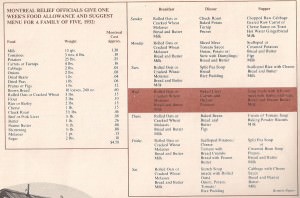Return to Black Tuesday: Surviving the Great Depression
A Bunch of Baloney
My great- grandmother now resides in a retirement residence, so interacting with other residents is a regular occurrence for me. One of the other residents who is a friend of Great-Gram’s, Joan, was also a child of the Depression. As such, she had a distinct memory that she wanted to share.
Joan had asked Great-Gram if she remembered getting blue coupons in the mail. Great- Gram, cursing her memory, said that she couldn’t remember.
Joan went on to describe how families would receive blue coupons, or what we know as food stamps, for meat. She remembered waiting in lines that seemed to go on for miles on end, just to use your stamps to pick up some meat. Her father would always use the coupons to purchase baloney, since it was the cheapest, and therefore he could get more.
“He’d always fry it,” said Joan of her father prepping meals of baloney. “I hated it that way the most.”
Nowadays, Joan refuses to eat baloney as she had more than her fill of it during the Depression. She claims she’ll only eat if now if it’s the kind with garlic. E then, she would really have to really think about it.
The End of the Depression with the Beginning of the War…
The argument has been made that the advent of the Second World War is what helped to bring about the end of the Great Depression. After all, men were needed to enlist in the military, while many women went to work in munitions factories, became nurses, or trained as home guards, should Canada need to be defended while the men were at war.
People had an income again, something that had eluding residents for so long; however, the war also brought about more food rationing, along with pricing controls. Because of this, the question has sometimes been raised of when the Great Depression truly came to an end.
Although there is no right or wrong answer, my great-grandmother sides with the advent of Second World War theory: people were working steadily again, and that was the main thing. For her, that was enough.
Return to the Present
The recent recession has certainly taken its toll on our nation, but Great-Gram’s Depression education has really helped to put things into perspective. Sure, finding steady work is proving difficult, especially with many of the available opportunities being far from preferable, but at least there are still potential jobs.
We still have our homes, as well as the bulk of our dignity. Most important, though, we don’t have to live off baloney!
Better known by my alias “Tilly,” I’m a proud Canadian who’s sixth- generation on the family homestead. I’m currently working on my B.A in English with Athabasca University by correspondence, and I firmly believe in using our freedom of speech to its fullest potential (it’s just as important as voting). For more of my idiosyncrasies, feel free to check out the following:
Twitter: @ChantelleTillyW
A Paper Voice (http://apapervoice.blogspot.com)
Linked In: Chantelle (Tilly) Wark
YouTube: Supermaam
Sources
– “Crash” Canada History Online
– “Depression” Gage Canadian Dictionary. 1997 Ed.
– Lowden, Jean. Great Depression Survivor. Caledonia, ON. 9 Sept. 2012
– Mennill, Paul. The Depression Years: Canada in the 1930’s. Scarborough, ON. 1978
























Share the post "Return to Black Tuesday: Surviving the Great Depression"